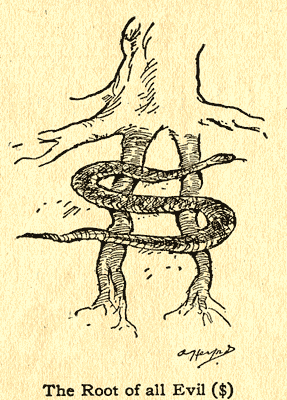 In our search to better understand the "Love of money is a root of all kinds of evil" verse (1 Tim 6:10), this posting will take a look at the greater context of Paul's situation in writing 1 Timothy. (See previous blog post.) What we find adds another fun twist on this discourse!
In our search to better understand the "Love of money is a root of all kinds of evil" verse (1 Tim 6:10), this posting will take a look at the greater context of Paul's situation in writing 1 Timothy. (See previous blog post.) What we find adds another fun twist on this discourse!
Because Paul had problems with Gnostics, Judiazers, and many others leading people from the church astray, Paul describes the godly traits of true teachers. Among other notable qualities such as self control, one such trait is that they are "not a lover of money" (3:4).
 This leads us to the Love of Money discourse in chapter 6. As throughout the book, Paul starts by arguing against teachers with "false doctrines", "who are conceited", "have an unhealthy interest in controversies and quarrels," and "who think that godliness is a means to financial gain" (6:3-5). These teachers were trying to profit from their heretical teachings, and thereby leading some people from the church astray. Wanting to get rich, both leaders and church members fell into temptations (6:9), leading Paul to conclude that the "love of money is a root of all kinds of evil. Some people, eager for money, have wandered from the faith and pierced themselves with many griefs" (6:10). Notably, this money problem in 1 Timothy commenced with the 'Christian' teachers, and their desire for profit.
This leads us to the Love of Money discourse in chapter 6. As throughout the book, Paul starts by arguing against teachers with "false doctrines", "who are conceited", "have an unhealthy interest in controversies and quarrels," and "who think that godliness is a means to financial gain" (6:3-5). These teachers were trying to profit from their heretical teachings, and thereby leading some people from the church astray. Wanting to get rich, both leaders and church members fell into temptations (6:9), leading Paul to conclude that the "love of money is a root of all kinds of evil. Some people, eager for money, have wandered from the faith and pierced themselves with many griefs" (6:10). Notably, this money problem in 1 Timothy commenced with the 'Christian' teachers, and their desire for profit. Paul saw firsthand how the desire of money influenced teachers and led to dangerous false doctrines and is a major theme throughout much of his writings. In 2 Corinthians, he is dealing with this same situation as in 1 Timothy. While Paul boasts that he preaches "free of charge" (11:7) and is "not a burden to anyone" (11:9), false apostles were trained speakers that profited off their deceptive teachings. They demanded payment for their services, which was customary in the first century. As they were teaching a different gospel, they even claimed that Paul's teachings had to be inferior since he was not paid by the congregation. Not only does Paul have to defend the teachings of Christ, he has to defend himself as an apostle and a teacher. No wonder he writes about these guys so much!
Paul saw firsthand how the desire of money influenced teachers and led to dangerous false doctrines and is a major theme throughout much of his writings. In 2 Corinthians, he is dealing with this same situation as in 1 Timothy. While Paul boasts that he preaches "free of charge" (11:7) and is "not a burden to anyone" (11:9), false apostles were trained speakers that profited off their deceptive teachings. They demanded payment for their services, which was customary in the first century. As they were teaching a different gospel, they even claimed that Paul's teachings had to be inferior since he was not paid by the congregation. Not only does Paul have to defend the teachings of Christ, he has to defend himself as an apostle and a teacher. No wonder he writes about these guys so much!The 'love of money as a root of all evil' verse is written in direct response to the prevalent conflict in the early church over false doctrine and teachers. Although people love to quote (and misquote) this verse in all types of arguments against Christian wealth, Paul is warning about the dangers of Christian leaders who desire to profit. After all, he is writing specifically to Timothy, a leader in the church of Ephesus. As this letter was widely circulated, it became a warning and admonishment to all followers of Christ. Don't let the desire for money influence sound doctrine based on the teachings of Jesus.
Pictures above are an illustration of the "root of evil" and a painting of Timothy as the Byzantines imagined him. The wolf in sheep's clothing picture represents the false teachers and is from www.zianet.com/maxey/reflx123.htm.









